Light Versus Dark In The Dark Knight and True Detective
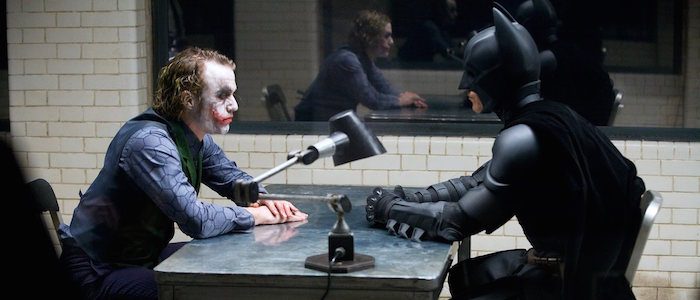
“See I’m not a monster, I’m just ahead of the curve.”
Released in 2008 and 2014 respectively, The Dark Knight and True Detective Season One share many crucial similarities. Both pieces of media were huge events in their respective mediums. The Dark Knight was a watershed moment in the film industry; a film that “conferred instant validity on the comic-book movie and realigned studios’ business strategies” according to The Atlantic‘s David Sims. On HBO, True Detective presented an ambitious story that bucked writing trends and structural expectations that most television show rigidly adhere to.
Additionally, The Dark Knight and True Detective are anchored by critically-lauded performances. Heath Ledger took home a posthumous Oscar for Best Supporting Actor for his incredible performance as The Joker. Empire‘s Mark Dinning called Ledger’s performance “towering” and many critics saw it as a career defining performance for the underrated actor. Meanwhile True Detective Matthew McConaughey and Woody Harrelson received well-deserved Golden Globe nominations their respective starring roles. McConaughey reached new heights in his ferocious performance as the outcast Rust Cohle, which overshadowed Harrelson’s impressive turn as Martin Hart. In a review for True Detective, USA Today’s Robert Bianco asserted that both actors “don’t just reach that bar [in terms of high profile drama acting], but sometimes seem to soar over it.”
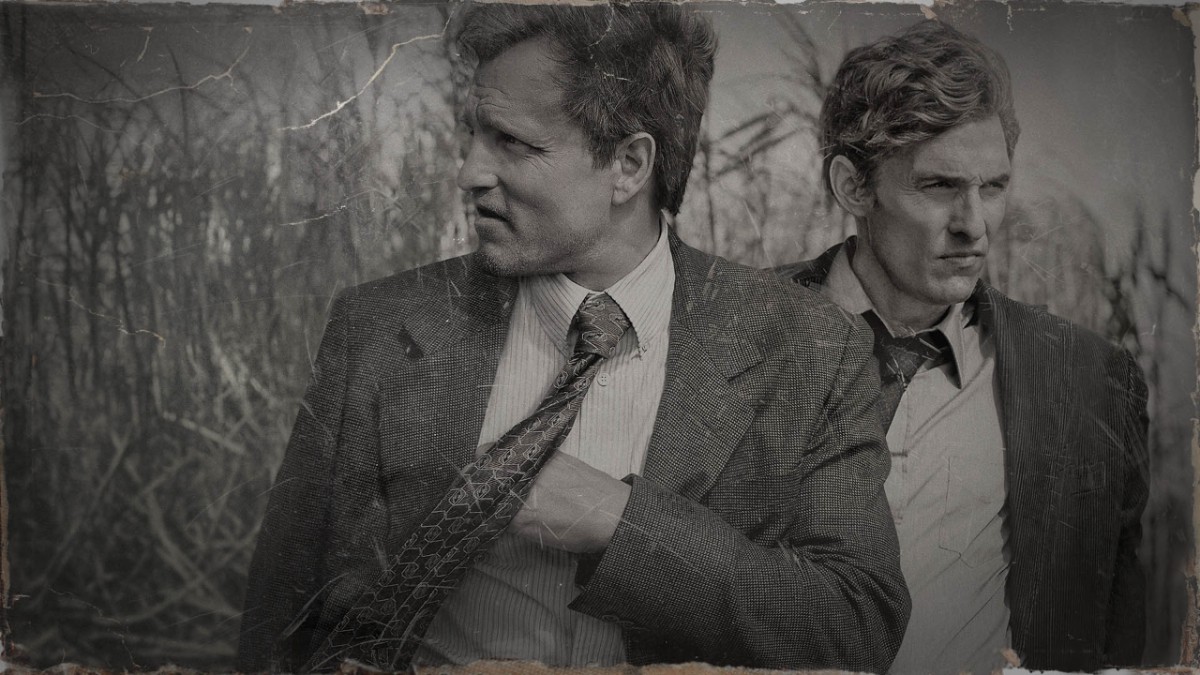
In the age where producers seem to exhibit an extreme amount of control and influence over films (look no further than Kevin Feige and Kathleen Kennedy), both Dark Knight and True Detective are notable for the trust that HBO and Warner Bros. respectively gave to the talented men and women working towards their respective visions of their narratives, especially the respective directors and writers. Writer Nic Pizzolatto wrote the entirety of True Detective without the use of the “writer’s room” technique, where multiple writers work together to write different episodes or parts of show’s overall season. Additionally, each of True Detective’s Season 1 episodes are directed by Cary Fukunaga; a choice that allows for a clear and consistent vision for the entire series, making the project feel like a ten hour film rather than a collection of related episodes. For The Dark Knight, director Christopher Nolan worked closely with Jonathan Nolan and David S. Goyers to develop a story and screenplay that would build and expand the world already created in Batman Begins. Unlike other franchise that fast track a sequel without the original director, Warner Bros. allowed Nolan the time to develop and execute Nolan’s vision for the sequel.
Perhaps the most intriguing and thought provoking similarities between True Detective and The Dark Knight are thematic. Both stories confront the troubling aspects of human nature, as well as what The Dark Knight director Christopher Nolan called the “ideas of guilt, fear, these strong impulses” that are found within its characters. The nuanced and complex narratives delve into the darkness of the human mind and soul, pushing its characters to confront nightmares in others, as well as in themselves. True Detective and The Dark Knight are morality plays where the codes and morals of their characters are challenged and confronted. This article will explore the thematic similarities and differences between these two landmark narratives, examining how both stories develop their themes and bring them to a close.
Presenting An Alternate Perspective on Society
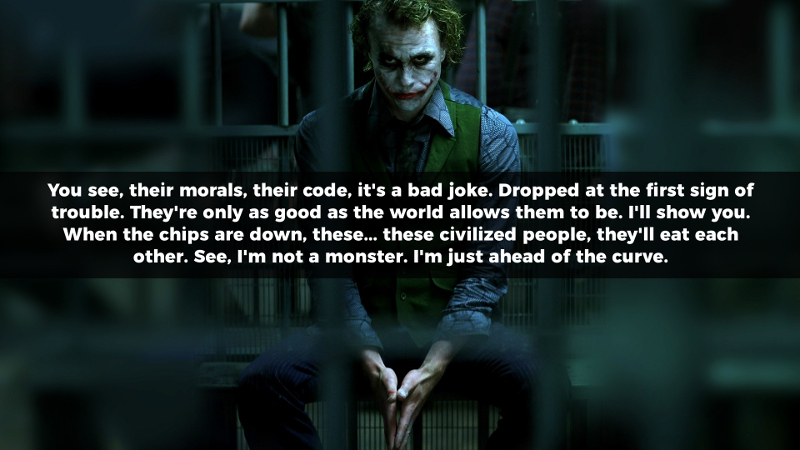
Binaries and conflicting ideologies are critical to creating conflict in a narrative. Both True Detective Season 1 and The Dark Knight are great examples of how to use conflicting viewpoints and ideological differences to create internal and external conflict. In both narrative, the viewer is presented with closely linked characters, with each character in the pair representing vastly different and often conflicting beliefs. By developing characters that hold these conflicting views, the narrative creates tension between the characters and challenges the validity of their respective viewpoints. By posing ideological and moral challenges to their characters, both narratives construct stories that cannot be resolved necessarily through physical conflicts, but often require a character to rethink or reexamine their moral framework.
In The Dark Knight, Batman and The Joker are engaged in a physical, moral, and ideological conflict, representing two different perspectives on humanity. These characters have key similarities that make them important foils to each other. For example, The Joker and Batman both operate outside of the law. Both characters utilize personas that hide their “true identities”. The Joker and Batman employ tactics that most police, the conventional authority, would deem excessive or inappropriate. Throughout the narrative, Nolan and his writing construct situations to highlight both the similarities and differences between both characters, which helps to enhance the moral and ethical questions raised within the film.
While Batman and The Joker’s relationship is legendary, their incarnations in The Dark Knight do not see eye to eye on the meaning of their relationship. Batman is dismissive of the similarities between himself and The Joker, labeling The Joker as “garbage who kills for money”. Unlike Batman, who refuses to admit or acknowledge their similarities, The Joker seeks to embrace their connection, reminding Batman that he is “just a freak, like me”. This dynamic is crucial to the narrative; two equal, yet opposite forces, battling for their visions of their city, with The Joker famously asserting that “you complete me”, an unnerving moment that demonstrates the uncomfortable nature of the two characters’ relationship.
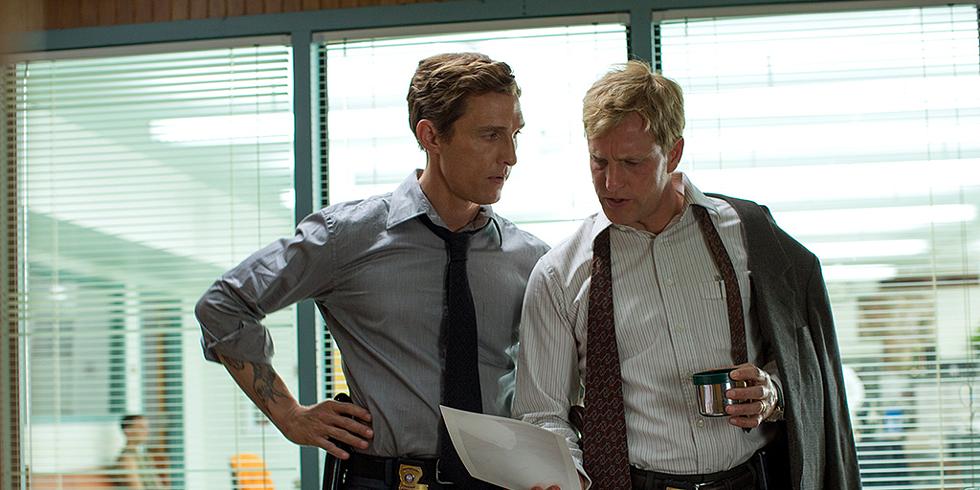
In True Detective, the “villain” is not the primary contrast to the heroes. Instead, the different view points and perspectives are present in Rust Cohle and Martin Hart. Once again, as in The Dark Knight, we have two characters who are considered “equals”. Both Rust and Martin are skilled detectives, bound together as partners on a horrifying new case. Due to the nature of their working relationship, the characters are tied to each other, just as the Joker and Batman are, their lives becoming interwoven in numerous ways. While the characters are not true opposites like Batman and The Joker, Cohle and Hart do present alternative view points on a number of topics, especially in our initial impressions of them in the early episodes of True Detective.
Much Like Batman and the Joker, Cohle and Hart are relatively new to each other in 1995, the earliest seen time period of the series. Hart’s initial dialogue in the first episode helps the viewer to recognize that Cohle has revealed very little about himself to Hart, despite being partners for about three months. Cohle has dodged invitations to Hart’s house for dinner, an intimate gathering usually reserved for friends and family. These story choices create a situation in which Rust is the unknown, a stranger waiting to reveal himself. This is a brilliant narrative design, as Cohle is simultaneously revealing his views to Hart and the audience at the same time, which makes each revelation and story about Rust feel essential to both the audience and Hart. The conversations between Cohle and Hart feel authentic, rather than forced exposition for the sake of filling in the gaps in knowledge the audience might have. Furthermore, the dialogue between Cohl and Hart is critical to the themes of the narrative. The partners’ arguments, conflicts, and discussion range from the mundane to the profound. Topics like human nature, the validity of religion, keys themes of the series, are progressed through these extensive and well written inter plays.
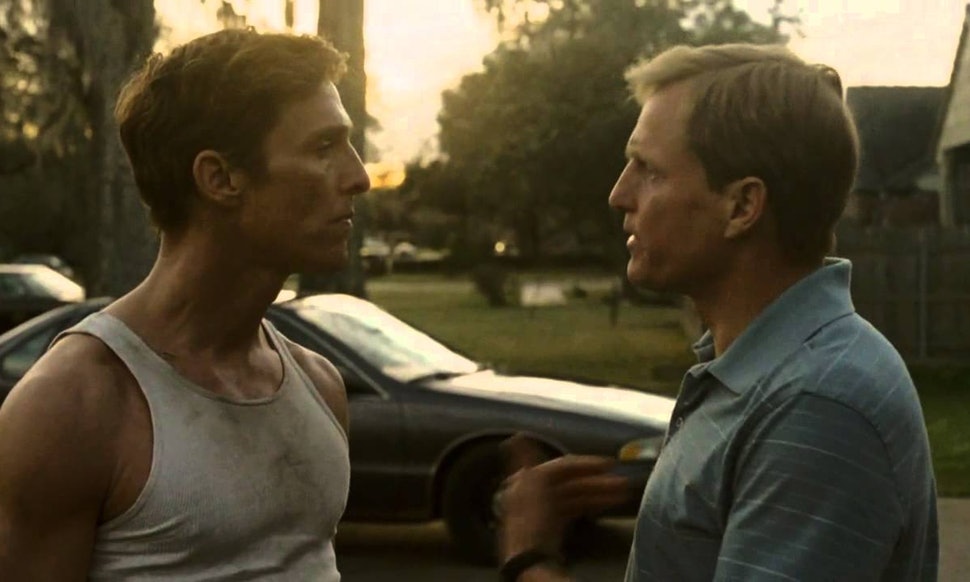
In his first monologue, Cohle explains his world view to both the viewer and Hart. Rust asserts that he considers himself “a realist… But in philosophical terms I’m what’s called a pessimist.” This is the introduction of an alternate perspective to Hart, who quickly balks at his speech asserting that they should “make the car a place of silent reflection from now on.” Much like Batman and The Joker, Rust Cohle and Martin Hart are quick to deride the beliefs that the other holds. Cohle, the atheist, derides religion as “fairy tales” while Hart sees religion as necessary, argue that “not everybody wants to sit alone in an empty room…some folks enjoy community. A common good”. Religion gives the community something to believe in, a goal to strive for, which ultimately will benefit society in a variety of ways.
Rust Cohle serves as an excellent challenge to Martin Hart’s more traditional beliefs. Cohle’s holds a similar perspective on human nature to The Joker. Both Cohle and The Joker assert that people are not inherently good, that instead they are only as “good as the world allows them to be”. The Joker asserts that when things go bad, that the people will “eat each other” while Cohle asserts the illusions that society constructs are “not good for anybody”. For both characters, their is an inherent pessimism in their perspectives, Joker asserts that human beings never panic “when things go ‘according to plan’…even if the plan is horrifying”. Similarly, Cohle’s investigation includes his superiors and fellow police officers show disregard for a group of murdered women, all of whom are from poor communities, who disenfranchised lives.
Both Cohle and The Joker provide a distinct challenge to their moral counterparts by providing alternative perspectives that challenge Hart and Batman’s world views. Now that these alternate perspectives have been firmly established, it’s time to examine both dramas, and to determine how and when the evidence supports which perspective.
Evidence For The Pessimist Perspective
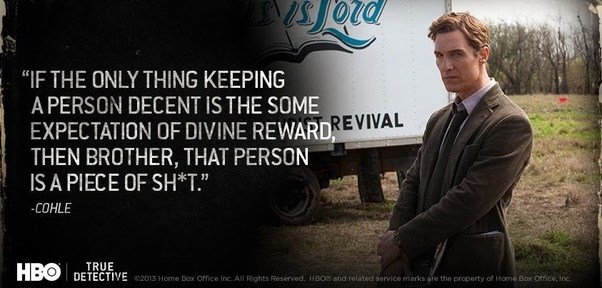
For Cohle and The Joker there seems to be ample evidence for their pessimist or “realistic” perspectives. There are a variety of experiences that demonstrate the illusion of the inherent meaning of life, that human beings are anything more than a “tragic misstep in evolution”. Cohle develops his perspective through his role as a grieving father, as an reckless addict who kills a junkie, and as a detective pursuing a serial killer. All of Cohle’s experience point to human beings as flawed and base, where human beings foolish struggle to create meaning in the face of a meaningless and cruel existence.
The Joker also provides amble evidence of trauma and a lack of meaning inherent in life. While we never know if any of The Joker’s several origins stories are true, he presents amble evidence of vice and gambling, as well as severe violence against women and children. These past events of both characters fuel their “pessimist” perspective, just as a scientific results fuel our support for a scientific theory.
Throughout The Dark Knight, the evidence for The Joker’s perspective mounts. The Joker is successful in a variety of moral confrontation with Batman. He is able to demonstrate on multiple occasions that human beings will break down under pressure, fear, greed, and anger, defaulting to actions Batman would deem immoral or unrighteous. Most importantly, he is even able to push Batman to his emotional and moral breaking point, where Batman loses control and savagely beats the Joker. The Joker asserts that “killing is making a choice” and the Joker is able to bring Batman to the brink of making that choice, an action that reveals how dangerous the Joker is to Batman, and how serious his moral and ideological challenges truly are.
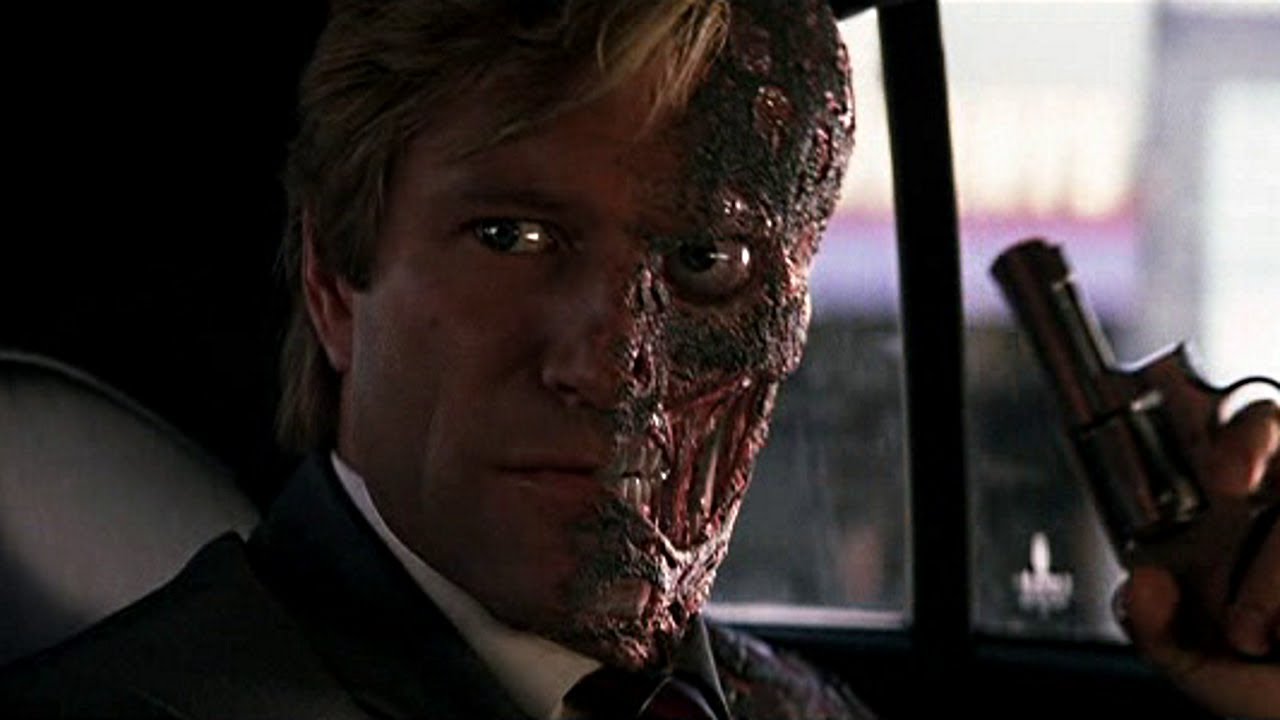
In True Detective, Cohle sees a vast amount of evidence for the meaninglessness of life in the failure of the investigation, the cover ups and conspiracies that protect the powerful. The events of True Detective confirm Cohle’s suspicious about the inherent cruelty and weakness in human beings (both in how we treat strangers and our own loved ones). Throughout both pieces of media, the viewer is not led to expect goodness and moral righteousness to emerge as stronger perspectives.
In both narratives, we seem to see our “heroes” on the brink of moral and ideological defeat. Detective Hart, who scoffs early at Cohle’s perspective, reveals his own character flaws over and over again in a string of affairs and spurts of torrential anger and violence. This disheartening turn is also seen in The Dark Knight‘s Harvey Dent, the character that Nolan asserts is the true protagonist of The Dark Knight. The death of Rachel Dawes sends Dent into a downward spiral, transforming a hero into an angry, violent, and vengeful human being. Harvey Two Face becomes bent on punishing a world that he once believed could rise above its flaws.
Both Hart and Dent betray their moral codes through violence, when both men killing unarmed men, despite their past commitments to moral righteousness. At these points, both shows point to the pessimist perspective as clearly more valid than the traditional perspectives originally held by Harvey Dent, Bruce Wayne and Martin Hart. In both narratives, we have seen the flaws of our protagonists revealed to the audience, we’ve seen them descend into their own anger, their own violence, and their own cruelty. This evidence seems to confirm the pessimistic perspective.
Moments of Triumph in The Dark
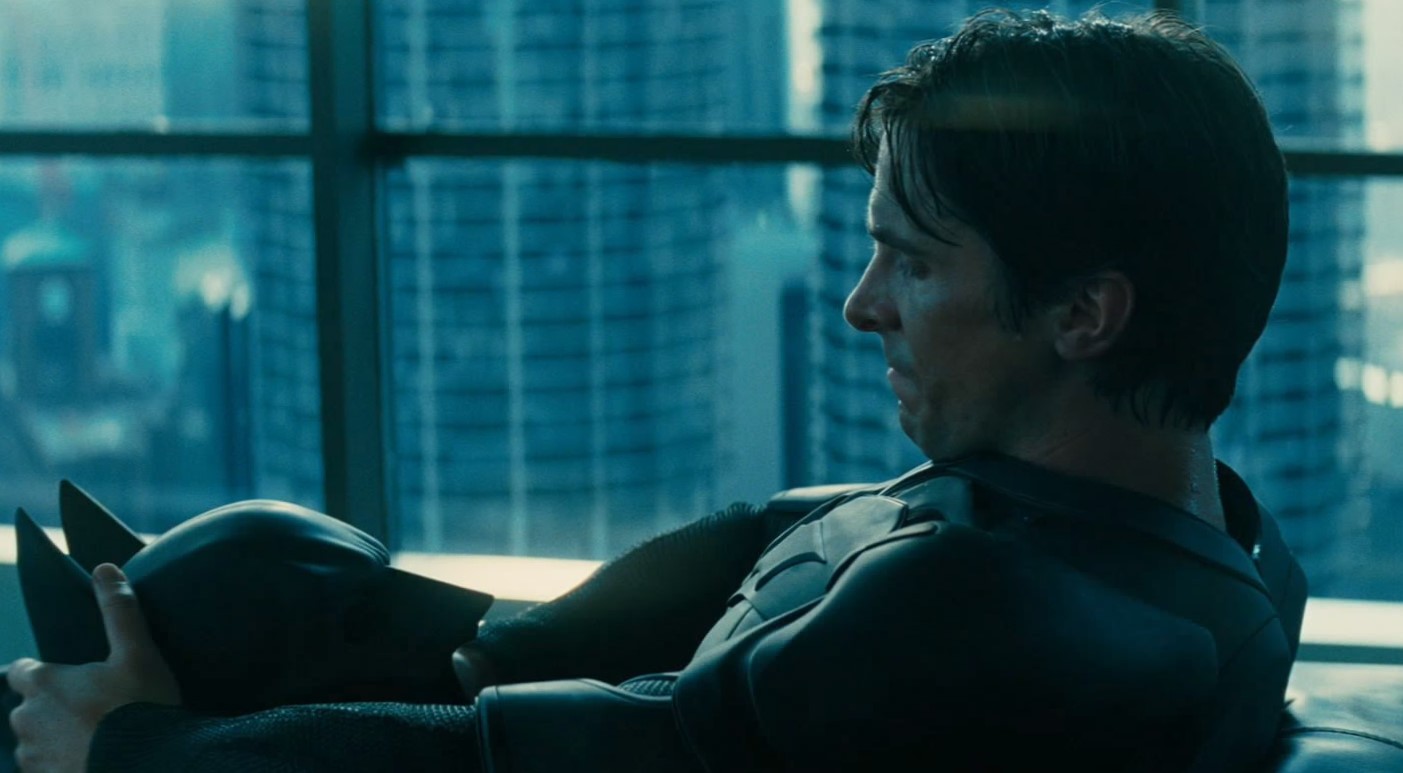
Despite the pessimism distilled in both narrative, both stories include significant moments of triumph for the traditional “optimist” perspective. In The Dark Knight, Batman is morally triumphant over the Joker when the citizens of Gotham choose not to kill each on the ferry boats. It’s a significant moment in the story, signified through the film’s music and acting. In this stunning moment of humanity triumphing over self preservation, the seemingly unbeatable villain looks truly vulnerable for the first time. Gotham has frustrated the Joker by defying his pessimistic expectations. This single one moment of optimism in humanity is crucial as it coincides with the Joker’s capture, both of which seem to be a “defeat”. While The Joker continues to funnel his pessimism perspective through Harvey Dent’s Two Face, Batman’s moral victory cannot be overlooked.
Many fans have viewed this moment as a failure, where The Dark Knight and Nolan create a view an overly optimist moment that doesn’t fit the rest of the cynical film. Yet, one needs to remember that this sequences doesn’t end Nolan film, in fact, few would assert that the destruction of the ferry boats would be more emotionally distressing than the ending of the film, in which Dent holds Gordon’s family hostage for the actions that Dent, Batman, and Gordon facilitated throughout the film. The fact that Nolan chose to make Batman triumphant in the ferry boat scene is significant, and the fact is contradicts much of the earlier film is an intentional choice.
In True Detective, Cohle and Hart succeed in killing the murderer, known sometimes simply as the “lawnmower man” because of his brief first appearance. Both Cohle and Hart are received brutally wounded in the struggle, a significant cost of their moral victory. Cohle goes into a coma, raising the possibility of his death. The creator and sole writer of True Detective, Nic Pizzolatto, asserted that he “even had an idea where something more mysterious happened to them, where they [Hart and Cohle] vanished into the unknown and Gilbough and Papania had to clean up the mess and nobody knows what happens to them. Or it could have gone full blown supernatural.” (INDIEWIRE) This is a critical acknowledgement by Nic Pizzolatto, as it illustrates that the writer had conceptualized several possible outcomes for the show.
Pizzolatto ultimately decided on his ending because the other alternatives would have denied the “realist questions the show had been asking all along. To retreat to the supernatural, or to take the easy dramatic route of killing a character in order to achieve an emotional response from the audience, I thought would have been a disservice to the story.” Pizzolatto instead chose to leave the characters in a “place of deliverance, a place where even Cohle might be able to acknowledge the possibility of grace in the world.” (INDIEWIRE).
In the final moments of the story, Rust bares his soul to Martin outside of the hospital. Cohle speaks about his daughter, a loss that the character has been stunchly opposed to discussing, explaining how he felt her love as he ebbed in his coma. It’s an incredibly moving monologue that illustrates the deep pain and guilt that Rust lives with on a daily basis. This is an incredibly powerful moment, with Matthew McConaughey giving what may be his finest performance. This moment of intimacy and revelation allows Hart and Cohle to have one final discussion, one that is integral to finalizing the themes explored in True Detective.
In the final scenes, Hart attempts to comfort Rust by asking him about his time as a youth in Alaska, where Rust would make up stories about the stars. In response, Rust responds that he could only think about one story while recovering: “the oldest one, light versus dark”. Looking up at the night sky, Hart asserts that the “dark has a lot more real estate”. This moment seems to confirm the pessimism the show that Cohl has been touting throughout the show. Just like the evidence in favor of pessimism presented throughout the experience, the darkness of the sky looms large over the light. However, this time it is Cohle, the pessimist, who contradicts the perspective he has ascribed to for much of the show. In his final line, Cohle asserts that “once there was only dark. You ask me, the light’s winning”.
Both True Detective and The Dark Knight are unflattering with their portrayal of human nature, which often support the perspectives of the pessimists in their respective stories. Yet both films provide singular case of optimism near the ends of their stories. Both films seems to illustrate that instances of human tragedy, failure, and flaws, do not invalidate optimism. Both narratives view life as a conflict between different sets of moral and ideological conflicts. Just as Cohle explains the meta narrative of “light versus dark” in the long history humanity, the narratives of The Dark Knight and True Detective Season 1 can be viewed as battles between the light and dark within human beings, where victor of this moral conflict is decided by our own moral experiences and beliefs.
Work Cited
Bianco, Robert. “’True Detective’: You Have the Right to Remain Dazzled.” USA Today, Gannett Satellite Information Network, 10 Jan. 2014, www.usatoday.com/story/life/tv/2014/01/09/true-detective-review/4393347/.
Fukunaga, Cary J, Nic Pizzolatto, Carol Cuddy, Matthew McConaughey, Woody Harrelson, Michelle Monaghan, Tory Kittles, Michael Potts, Adam Arkapaw, and T-Bone Burnett. True Detective: [the Complete First Season]. , 2014.
Jagernauth, Kevin. “’True Detective’ Creator Nic Pizzolatto Reveals Alternate Endings & Shares Season 2 Story Details.” IndieWire, Indiewire, 10 Mar. 2014, www.indiewire.com/2014/03/true-detective-creator-nic-pizzolatto-reveals-alternate-endings-shares-season-2-story-details-88451/.
Nolan, Christopher, Charles Roven, Emma Thomas, David S. Goyer, Jonathan Nolan, Christian Bale, Heath Ledger, Aaron Eckhart, Michael Caine, Maggie Gyllenhaal, Gary Oldman, Morgan Freeman, James N. Howard, Hans Zimmer, and Bob Kane. The Dark Knight. Burbank, CA: Warner Home Video, 2008.
Setoodeh, Ramin. “Christopher Nolan: Villains Defined The Dark Knight Trilogy More Than Batman.” Variety, Variety, 12 May 2018, variety.com/2018/film/news/christopher-nolan-on-how-villains-defined-the-dark-knight-trilogy-more-than-batman-1202808441/.
Sims, David. “’The Dark Knight’ Changed Hollywood Movies Forever.” The Atlantic, Atlantic Media Company, 18 July 2018, www.theatlantic.com/entertainment/archive/2018/07/the-dark-knight-legitimized-the-superhero-movie-for-better-and-worse/565448/.
What do you think? Leave a comment.











The Dark Knight takes itself more seriously than any film ever made. Apart from the Joker toddling away from a burning hospital in a nurses outfit and high heels it is no fun at all, which for a movie based on a comic book is a crime.
comic books aren’t filled with jokes. In fact many batman comics have tackle pretty serious subjects like rape, domestic abuse, drug abuse, becoming disabled, which results in storylines about committing suicide.
Also, “Dead woman in a fridge”
Alright alriiiight…
Woody Harrelson had the best line: “Who walks that fucking slow?”…had my wife and I in stitches.
McConaughey was a revelation, couldn’t take my eyes off him whenever he was on screen… even when he wasn’t in a singlet..
I enjoyed True Detective season one, but feel I need to rewatch as i can’t shake the feeling that it had less depth than it pretended to. This might be entirely unfair, but part of me feels that a lot of the interesting references and imagery was surface glitz, that, just as with the structure, covers up a fairly standard cop drama. As I said, I could be wrong on this point, so it’s likely I’ll rewatch to see how far it really stands up to all of that.
For me it was a painful as reading sixth-former poetry.
I was hesitant at first, but boy, did this take off. Loved every episode and the time warp was executed masterfully.
Best show for years.
Great analysis. The Dark Knight, in my opinion, pushed boundaries for superhero films and managed to engage both general/niche audiences and critics alike. The Nolans and Goyer took the pieces of established Batman mythos and adapted it in a way that illustrates the effects Batman would have if he were real while still giving Batman fans what they want. True Detective season 1 is just hands down one of my all-time favorite pieces of media.
I appreciate you including Pizzolatto’s quote concerning his decision on the final ending, as it shows how a writer juggles outcomes when developing a story, and thankfully, he went with one that remained consistent to the season’s themes. Philosophy is a field I’ve recently developed an interest in and I plan to find more shows and movies that explore various schools of thought, especially if they do it in similar fashions of True Detective.
True Detective left a massive hole in my life when it ended. Luckily season 3 is nearly as good as season 1 (so far anyway).
It started well and promised much but in the end delivered little-overrated! Over stylised and drawn out to the point of tedium-after awhile McConaughey’s hoarse whisperings became irritating-not surprised the 2 leads jumped ship.
god almighty, what a fantastic series.
I could watch the opening credits of True Detective sequence on repeat for hours they are spellbinding.
MM and WH both incredible, and the dialogue was fantastic, and their characters were extraordinarily realised. Screen writer Nic Pizzolato – not HBO – retains the rights to the characters so we may see them crop up in his future novels.
As regards to the ending, I was a bit surprised as to the backlash. All along we knew the killer was fcked up with all the drawings, antlers, etc. Some backwoods guy in the middle of no where raping and murdering and getting away with it, particular in (the chaotic aftermath of hurricane katrina). And lets face it, cover ups involving organised religion are all too believable.
For what its worth, my dad worked in serious crimes for many years, and this was one of the very few detective shows he managed to sit through without complaining about it. He said the frustration of some of the bad guys not getting just desserts and untidy conclusions to cases were all too common, something not really shown on TV police shows which tend to have much tidier conclusions than real life.
The series was great in many ways. However, I was somewhat disappointed with the final episode. There was too much put into building a mythology about secret cults, esoteric philosophies and hints at supernatural occurrences for a completely mundane ending ever to be satisfying. Yes, it was realistic, but the show was not realistic up to that point so it was something of a let down. Regardless, despite my slight reservations about the ending, True Detectives was of consistently great quality and hugely enjoyable.
The theme still pops up in my head.
The only letdown I think with True Detective was the cliched chase through the killer’s maze at the very end. Then again, having built up the mystery and the Lovecraftian horror for the past 7 episodes, the final reveal was bound to be disappointing. However, I did think the ending was a mature and surprising turn, from both Rust’s character and the writers in general. Despite all the miserable nihilism throughout, the end message is that life is worth living and people are worth loving.
I thought the clichéd ending was supposed to be part of the point.
Totally agree with you.. The maze scene wasn’t the end, just another accessory to get to the End.. Whole story was about Rust n Cole’s fall.. With final beautiful touching revelation.. Just MHO..
Whenever a show gives me a woody I have no complaints…
The Dark Knight is very much of it’s time in that people wanted super heroes to be serious, so serious it was. 10 years on, super hero films have gone a completely different direction. Now they’re… well, a bit of fun? The Marvel films often have this vein of fun-ness through them that the DC films woefully lack.
I think that’s the beauty of Marvel’s balance with things mostly being light hearted, when they do go dark (as in this years Infinity War, Captain America Civil War being good examples) it actually feels like it means something.
The problem with DC films after TDK is that they are overtly grim and dark all the time, because they think this is what made it successful. It was part of it, but it was the performance of Ledger as the Joker more than anything else that dragged this film from mediocrity.
DC films are not so dark that it is a slog to watch them. They are oppressive, they are not fun. There is no change of tone to provide some relief, however momentary. Darkness for the sake of it does not work. Anything for the sake of it in a movie does not work.
Still remember going to the IMAX to see The Dark Knight for my birthday, and being blown away by it when I came out. The pacing of the film is perfect, and Nolan keeps all his secrets under wraps, as they are unfolded with impeccable flow. 2 and half hours just went in no time, and I was left feeling Id seen an all time classic.
A superb film, and a brilliant film maker in general, we are lucky to have Nolan.
Just watched first season of True Detective and the actual hunt for the serial killer is pretty secondary to the character study of the two detectives.
If there is a follow up, maybe having got all the character development done in the first season, we’ll get a story where the actual crime is the focus.
Very excited about starting to watch True Detective, I loved TDN!
The only criticism I would have is that The Dark Knight is about 20 mins too long ( I could cheerfully lose the whole ‘ bombs on two boats ‘ bit ) and it’s a shame that they killed TwoFace off at the end instead of the Joker, but then they weren’t to know that Heath wouldn’t be coming back….
Loved the first series of td, TV at its very best.
My take on what’s went on with the quality of season two is that Pizzolatto is trying to do a David Lynch, without really understanding what makes a David Lynch movie work.
Take Mulholland Drive, for example: it’s confusing, you don’t know what’s going on, not much of it makes sense, and yet, you’re happy to go along for the ride because, whilst you’re befuddled, you are being taken somewhere. Where? Only Lynch knows, but you do feel carried along by him.
True Detective 2, has many of Lynch’s staples – the scene in episode 2(?) with Vaughn gazing up at the ceiling in the half-light was straight out of Lost Highway; the bar with the weird artistes playing their melancholy songs, straight out of Twin Peaks; the affected dialogue; the masked crow…
At first I thought it was a rip-off, and protested, then I thought it was a homage and relaxed. Now I think it’s little more than a ham-fisted attempt to bewilder like Lynch without understanding how he actually takes viewers along with him.
When the finale aired of TD, I was a little disappointed because I had embroidered so many theories that I hoped would be recognized as brilliantly perceptive… but watching the last episode again, I was satisfied with how it ended: realism (you never get all the bad guys, sometimes however brilliant you are, you can’t see the forest for the trees) rather than some overly clever tying up of plot knots, leaving the loopholes that always exist in real life. And I wouldn’t have missed Rust’s and Marty’s spectacular (and spectacularly moving) breakdowns for anything in the world. What incredible actors McConaughey and Harrelson are.
Over the past few months, the story has lingered with me way beyond my previous favorite Breaking Bad. I just can’t get Rust Cohle out of my head.
The recent hint McConaughey gave that he might return to do another series of True Detective have given fans a glimmer of hope.
How about a prequel series with Rust as Crash??
No character has got in my head so firmly – only 8 episodes.
Regarding the finale, I felt exactly the same.
This was the darkest, most satisfying TV show I have ever seen, and I rarely watch TV series – something I will have to change. McConaughey – incredible. Soundtrack – incredible. Script – dark, dark, dark and original.
Meh, it doesn’t stay with me half as much as Jesse from Breaking Bad, but each to their own.
According to promos/information from the next True Detectives Season 3, there is a photo of Rust and Hart in the background of a scene/on a lap top. So Season 3 and Season 1 both take place in the same universe. Perhaps there is a connection between the two seasons…
I liked the sequel with Bane and his Occupy-esque revolution. The billionaire Batman saved the day and restored the world to the correct order.
We need more movies like this, people.
An engaging discussion on a comparison that would not have occurred to me to consider. Thanks for sharing this.
Great discussion of The Dark Knight and True Detective and their relationship to one another! I most definitely agree with you about how Batman and the Joker are “two equal, yet opposite forces.” You raise a lot of interesting points. Good job!
This is a really well written article that wisely chooses its points of discussion in regards to The Dark Knight. One of the best points considered within this article is the purpose Nolan had in giving the audience a significant moment of triumph. Throughout the whole film, the Joker and Batman lock horns over their two different ideologies. The Ferry scene that arises within the final half hour challenges the traditional optimist perspective by inviting Gotham to choose self preservation over retaining humanity. Yet in this stunning moment, Nolan decides to display Gotham’s moral ambiguity – that the citizens themselves are not morally bereft human beings that only look for themselves. They are not ALL JOKERS. The Joker is the only Joker – and that infuriates the
brilliantly acted villain – who becomes truly vulnerable for the first time. It is in this scene when the Joker’s yearning for acceptance – is founded. After all the fear he’s provoked, he still cannot eliminate the principles of human nature from everyone.
This is a really well written article that wisely chooses its points of discussion in regards to The Dark Knight. One of the best points considered within this article is the purpose Nolan had in giving the audience a significant moment of triumph. Throughout the whole film, the Joker and Batman lock horns over their two different ideologies. Hence, The Ferry scene that arises within the final half hour is essential for the
Joker’s challenging of the traditional optimist perspective by inviting Gotham to choose self preservation over retaining humanity. Yet in this stunning moment, Nolan decides to display Gotham’s moral ambiguity – that the citizens themselves are not morally bereft human beings that only look for themselves. They are not ALL JOKERS. The Joker is the only Joker – and that infuriates the brilliantly acted villain – who becomes truly vulnerable for the first time. It is in this scene when the Joker’s yearning for acceptance – is founded. After all the fear he’s provoked, he still cannot eliminate the principles of human nature from everyone. “He is alone”.
In The Dark Knight, the villain is a nihilist, but in True Detective the hero is a nihilist.
I am wondering how this comparison would work in light of the movie The Joker.